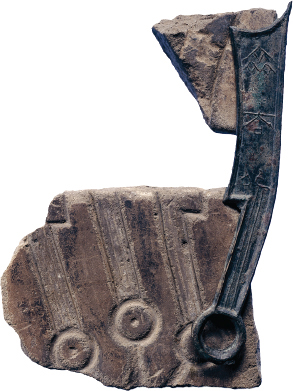Individuals in Society: Lord Mengchang

Dring the Warring States Period, men could rise to high rank on the basis of talent. Lord Mengchang rose on the basis of his people skills: he treated his retainers so well that he attracted thousands of talented men to his service, enabling him to rise to prime minister of his native state of Qi (chee) in the early third century B.C.E.
Lord Mengchang’s beginnings were not promising. His father, a member of the Qi royal family, already had more than forty sons when Mengchang was born, and he ordered the mother, one of his many concubines, to leave the baby to die. She, however, secretly reared him, and while still a child he was able to win his father’s approval through his cleverness.
At his father’s death Mengchang succeeded him. Because Mengchang would provide room and board to men who sought to serve him, he soon attracted a few thousand retainers, many of humble background, some fleeing justice. Every night, we are told, he ate with them all in his hall, treating them equally no matter what their social origins.
Most of the stories about Mengchang revolve around retainers who solved his problems in clever ways. Once, when Mengchang had been sent as an envoy to Qin, the king of Qin was persuaded not to let so talented a minister return to help Qi. Under house arrest, Mengchang was able to ask one of the king’s consorts to help him, but in exchange she wanted a fur coat kept in the king’s treasury. A former thief among Mengchang’s retainers stole it for him, and Mengchang was soon on his way. By the time he reached the barrier gate, Qin soldiers were pursuing him, and he knew that he had to get through quickly. One of his retainers imitated the crowing of a cock, which got the other cocks to crow, making the guards think it was dawn, so they opened the gates and let his party through.
When Mengchang served as prime minister of Qi, his retainers came up with many clever stratagems that convinced the nearby states of Wei and Han to join Qi in resisting Qin. Several times, one of his retainers of modest origins, Feng Xuan (schwan), helped Mengchang withstand the political vicissitudes of the day. When sent to collect debts owed to Mengchang in his fief of Xue, Feng Xuan instead forgave all the debts of those too poor to repay their loans. Later, when Lord Mengchang lost his post at court and returned to his fief, most of his retainers deserted him, but he found himself well loved by the local residents, all because of Feng Xuan’s generosity in his name. After Mengchang reattained his court post and was traveling back to Qi, he complained to Feng Xuan about those who had deserted him. Feng Xuan, we are told, got down from the carriage and bowed to Lord Mengchang, and when pressed said that the lord should accept the retainers’ departures as part of the natural order of things:
Wealth and honor attract while poverty and lowliness repel; such is the nature of things. Think of it like the market. In the morning it is crowded and in the evening it is deserted. This is not because people prefer the morning to the evening, but rather because what they want can not be found there [in the evening]. Do not let the fact that your retainers left when you lost your position lead you to bar them from returning. I hope that you will treat them just the way you did before.*
QUESTIONS FOR ANALYSIS
- How did Mengchang attract his many retainers, and how did their service benefit him?
- Who in this story benefited from hereditary privilege, and who advanced because of ability? What does this suggest about social mobility during the Warring States Period?
- Many of the stories about Mengchang are included in Intrigues of the Warring States, a book that Confucians disapproved of. What do you think they found objectionable?

DOCUMENT PROJECT
How did rulers and their subordinates interact during the Warring States Period? Read a selection of stories from the Warring States Period, and then complete a quiz and writing assignment based on the evidence and details from this chapter. See Document Project for Chapter 4